Herbs that modulate cortisol help balance your stress response, supporting adrenal health and overall well-being. Key adaptogens like Ashwagandha, Rhodiola, and Holy Basil boost resilience, reduce fatigue, and promote calmness by influencing the HPA axis and phytochemicals like flavonoids. Incorporating these herbs into your routine can improve mental clarity and emotional stability. Stay with us to explore how each herb uniquely contributes to managing stress and enhancing your resilience naturally.
Key Takeaways
- Adaptogenic herbs like Ashwagandha, Rhodiola, and Holy Basil help regulate cortisol levels and improve the body’s stress response.
- Phytochemicals such as flavonoids and polyphenols in these herbs influence neural pathways linked to stress.
- Proper herbal sourcing and quality control enhance the effectiveness of cortisol-modulating supplements.
- Traditional systems like Ayurveda and Chinese Medicine utilize these herbs to support adrenal health and resilience.
- Incorporating calming herbs like Holy Basil promotes mental clarity and reduces stress by balancing cortisol secretion.
Understanding Cortisol and Its Role in Stress

Cortisol is a hormone produced by your adrenal glands that plays a crucial role in your body’s stress response. Your cortisol secretion patterns follow a daily rhythm, peaking in the morning to help you wake up and gradually declining throughout the day. When you encounter stress, these patterns shift as your body releases more cortisol to manage the situation. Understanding stress hormone interactions is key to recognizing how cortisol influences other systems, like immune function and metabolism. High or prolonged cortisol levels can lead to health issues, making it important to keep these patterns balanced. By learning how your body naturally regulates cortisol, you gain insight into how stress impacts your well-being and how certain herbs might help modulate these responses. Monitoring cortisol levels can provide valuable insights into overall health and stress management and the importance of maintaining balanced cortisol levels. Additionally, understanding the impact of stress management techniques can further support hormonal balance.
The Science Behind Herbs That Influence Cortisol Levels

Herbs can influence your body’s stress response by affecting the HPA axis, which regulates cortisol production. Their phytochemicals interact with this system, helping to modulate hormone levels. Understanding these mechanisms reveals how specific herbs can support your stress management naturally. Additionally, some herbs are formulated with optimized delivery methods to enhance their efficacy in modulating cortisol levels. For example, certain herbal preparations may utilize bioavailability enhancement techniques to ensure active compounds reach their target sites more effectively. Incorporating traditional herbal practices that target stress-related pathways can further improve the effectiveness of these natural remedies. Recognizing the role of culinary herbs used in regional cuisines can also contribute to balanced cortisol levels through their mild adaptogenic properties. Exploring herbal synergism can amplify these effects, offering more comprehensive support for stress regulation.
Herbal Impact on HPA Axis
Understanding how certain herbs influence the hypothalamic-pituitary-adrenal (HPA) axis reveals their potential to modulate cortisol levels effectively. These herbs often work through herbal synergy, enhancing stress adaptation by supporting your body’s natural response. When the HPA axis functions ideally, you experience better resilience to stress and balanced cortisol levels. For example:
| Herb | Effect on HPA Axis | Result |
|---|---|---|
| Ashwagandha | Regulates cortisol secretion | Reduces stress response |
| Rhodiola | Supports stress adaptation | Boosts mental clarity |
| Holy Basil | Modulates HPA activity | Promotes calmness |
Additionally, understanding the best free keto diet app can help in managing overall health and stress levels through proper nutrition. Recognizing the importance of neural network integration in herbal research can optimize understanding of how these herbs impact the HPA axis. Herbal synergy plays a crucial role in enhancing the effectiveness of stress-modulating herbs, allowing for better hormonal balance. Moreover, considering individual differences in stress response can improve the efficacy of herbal interventions.
Phytochemicals and Cortisol
Phytochemicals are bioactive compounds found in herbs that directly influence how your body regulates cortisol levels. These compounds are present in various plant extracts, each contributing unique effects. When you consume herbs rich in phytochemicals, you benefit from phytochemical synergy, where multiple compounds work together to enhance cortisol modulation. This synergy can amplify the herbs’ calming effects, helping to reduce stress and support adrenal health. Scientific studies show that specific phytochemicals, like flavonoids and polyphenols, can inhibit enzymes involved in cortisol production or influence neural pathways that regulate stress responses. By understanding how these phytochemicals interact, you can select herbs that optimize cortisol balance naturally and safely, harnessing the power of plant chemistry for stress relief. Understanding phytochemical interactions is essential for developing effective herbal remedies for stress management.
Adaptogenic Herbs and Their Stress-Relieving Properties
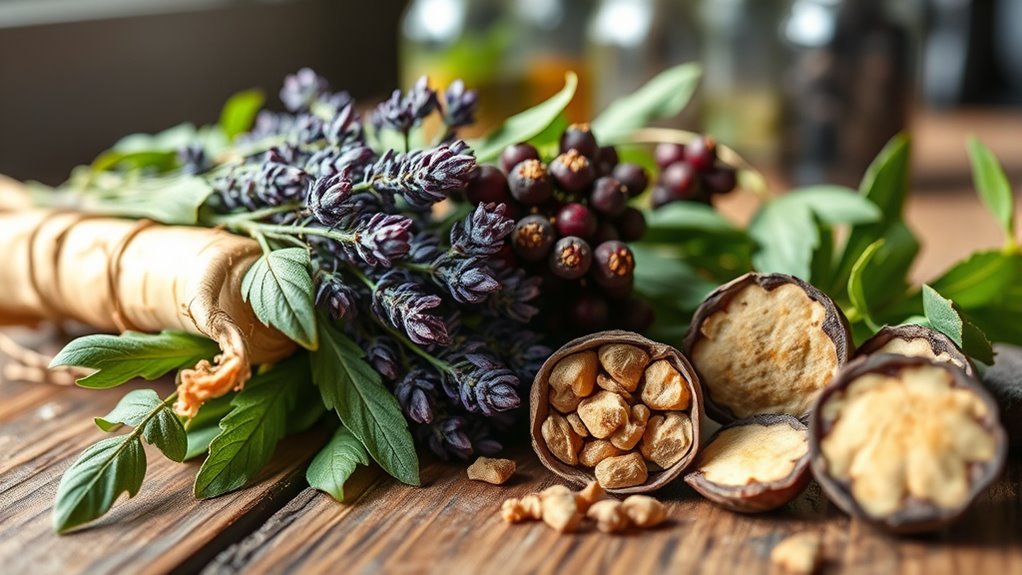
Adaptogenic herbs have gained popularity for their ability to help your body adapt to stress and restore balance. These herbs work by modulating cortisol levels and supporting your adrenal function. You can explore their stress-relieving properties through various herbal extraction methods, which preserve active compounds effectively. Many traditional medicine practices, like Ayurveda and Traditional Chinese Medicine, have long used adaptogens for stress management. Understanding these herbs’ mechanisms can enhance your wellness routine. Here’s a quick overview:
| Herb | Key Benefits |
|---|---|
| Rhodiola Rosea | Boosts energy, reduces fatigue |
| Holy Basil | Supports adrenal health |
| Schisandra | Enhances resilience to stress |
| Eleuthero | Improves mental clarity |
| Ginseng | Balances cortisol, boosts immunity |
Ashwagandha: An Ancient Remedy for Modern Stress

Ashwagandha has been used for centuries to help your body adapt to stress and improve resilience. It works by regulating cortisol levels, making it easier for you to handle daily pressures. Incorporating this ancient herb can naturally support your stress response and boost overall well-being.
Adaptogenic Stress Reduction
When stress levels spike, turning to natural solutions can help restore balance. Adaptogenic herbs like Ashwagandha promote herbal synergy, supporting your body’s ability to handle stress. These herbs work by modulating stress biomarkers, reducing the physiological impact of stress without causing fatigue or suppression. Ashwagandha, in particular, enhances resilience by stabilizing the stress response, making it easier to cope with daily pressures. Its adaptogenic properties help your body adapt to stressors more efficiently, promoting mental clarity and emotional stability. Additionally, practicing proper gear shifting techniques while cycling can help reduce physical stress and improve overall well-being. Incorporating nutritional support such as biotin and zinc may further support your body’s ability to manage stress and maintain health. Including a balanced diet and hydration routine can also significantly influence your body’s stress response. Moreover, understanding the role of sustainable farming practices in herbal cultivation can ensure the quality and efficacy of adaptogenic herbs. Recognizing the importance of herbal quality control helps in selecting the most effective supplements for stress modulation. By integrating adaptogens into your routine, you support a balanced stress response naturally, without the need for synthetic interventions. This approach fosters long-term resilience and overall well-being, empowering you to face stress with greater confidence.
Cortisol Level Regulation
As modern lifestyles continue to elevate stress levels, managing cortisol—the body’s primary stress hormone—has become increasingly important. Ashwagandha is a well-known herb for regulating cortisol levels naturally. When using ashwagandha, it’s vital to follow recommended herbal dosages to guarantee effectiveness without risking adverse effects. Most studies suggest doses ranging from 300 to 600 mg daily, but individual needs can vary. Safety considerations include consulting a healthcare professional, especially if you’re pregnant, nursing, or on medication. While ashwagandha is generally safe for short-term use, prolonged intake should be monitored. Proper dosage and cautious use help you harness its benefits in cortisol regulation while minimizing potential side effects, making it a reliable addition to your stress management toolkit. Additionally, incorporating herbal remedies like ashwagandha can complement other stress-reducing practices for more comprehensive cortisol management. Understanding the herbal supplement properties can optimize their effectiveness and safety in stress support. Recognizing best beaches for relaxation can also enhance overall stress relief and mental well-being. Being aware of city-to-country living as a lifestyle choice can further support holistic stress reduction strategies. Incorporating Dog breeds known for calm and gentle temperaments, such as Golden Retrievers, can also provide emotional support and reduce stress levels.
Enhancing Resilience Naturally
In today’s fast-paced world, building resilience is essential to effectively manage stress and maintain well-being. Ashwagandha offers a powerful natural remedy by enhancing your body’s resilience through herbal synergy. It works by modulating cortisol pathways, helping your body adapt to stress more efficiently. When you incorporate ashwagandha into your routine, you’re supporting your adrenal health and reducing the impact of daily stressors. This adaptogenic herb promotes a balanced stress response, so you can stay calmer and more focused. By strengthening your resilience naturally, you’re better equipped to handle challenges without over-relying on external substances. Incorporating sound design techniques, such as layering different effects, can also help create a calming environment that supports mental well-being. Consistent use of ashwagandha can foster a resilient mindset, allowing you to face modern stressors with greater ease and stability.
Rhodiola Rosea: Boosting Energy and Reducing Fatigue
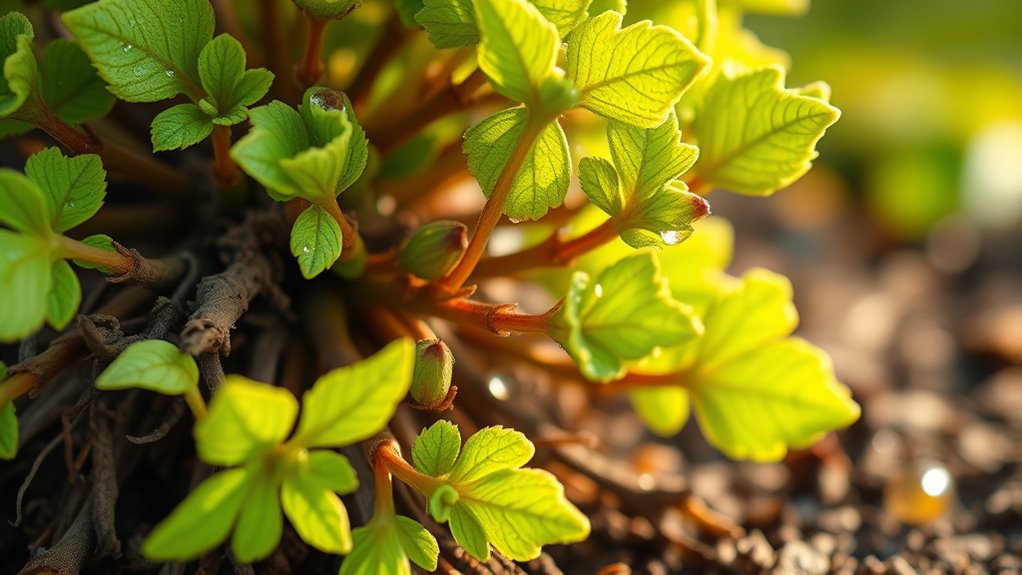
Rhodiola Rosea is a powerful adaptogen that can help you boost energy levels and fight fatigue. By supporting your body’s ability to adapt to stress, it promotes mental clarity and physical stamina. Its herbal synergy enhances your resilience, making daily challenges easier to handle. Incorporating Rhodiola into your diet through dietary integration allows you to experience its benefits more effectively. You might add it as a supplement or include it in herbal teas, ensuring consistent use to optimize results. Rhodiola’s ability to modulate cortisol levels helps prevent exhaustion caused by chronic stress, keeping you energized throughout the day. Its natural properties make it a valuable addition to your wellness routine, especially when combined with other adaptogens for a balanced approach to energy and fatigue management.
Holy Basil (Tulsi): A Sacred Herb for Calming the Mind
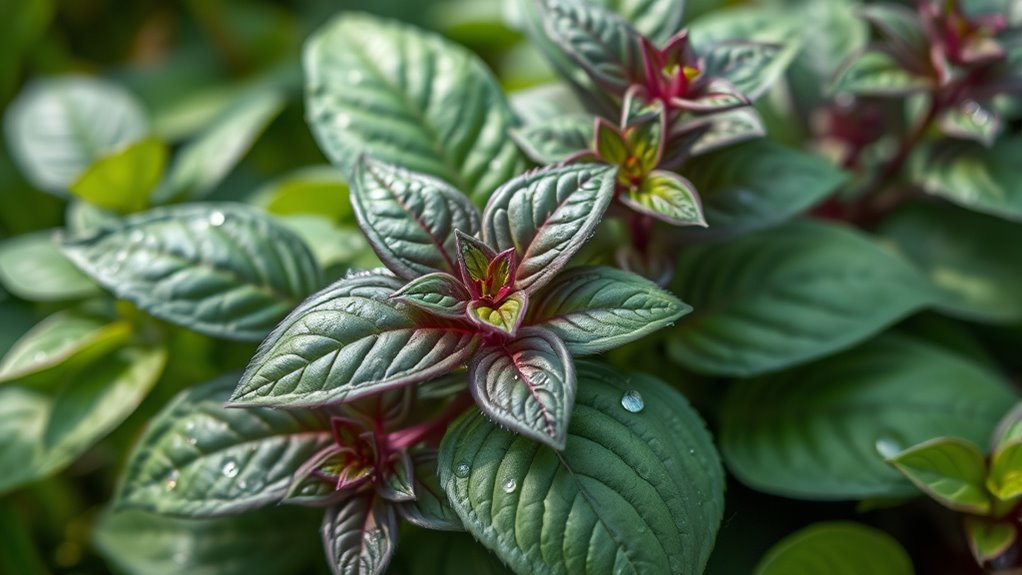
Building on the energy-boosting effects of Rhodiola, Holy Basil, also known as Tulsi, offers a natural way to calm the mind and reduce stress. Rooted in sacred traditions, Tulsi has been used in herbal ceremonies for centuries to promote spiritual and mental clarity. Its adaptogenic properties help modulate cortisol levels, supporting your body’s response to stress. When you include Holy Basil in your routine, you tap into a herb revered for its calming effects and spiritual significance. Many cultures consider Tulsi a sacred herb, integrating it into rituals to foster balance and tranquility. Incorporating Holy Basil into your daily life can help you manage stress more effectively while honoring its rich history rooted in sacred practices.
Licorice Root: Balancing Cortisol and Supporting Adrenal Health
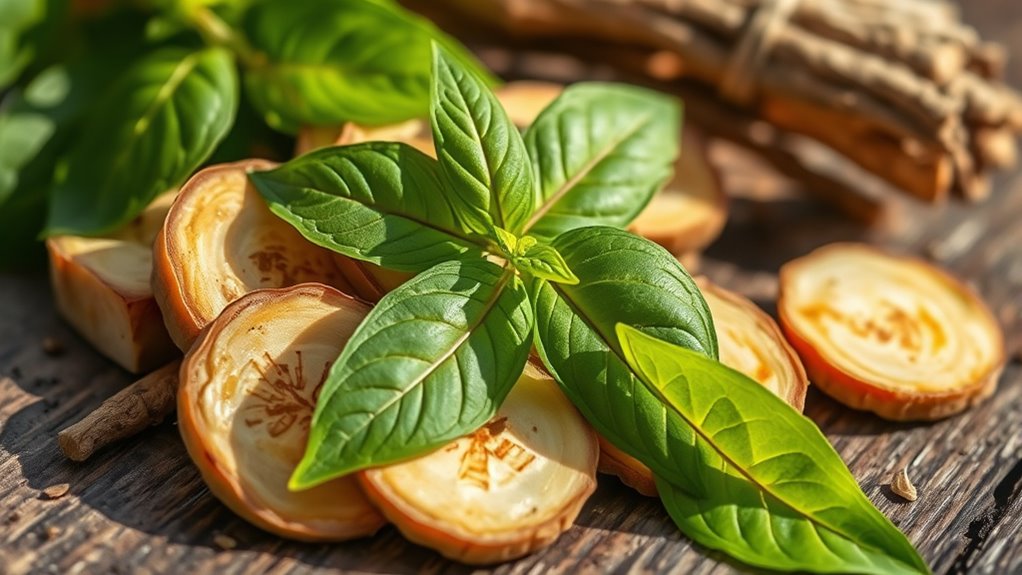
Licorice root has long been valued for its ability to support adrenal health and help regulate cortisol levels. Its unique herbal synergy influences cortisol metabolism by inhibiting enzymes that break down cortisol too quickly, thereby maintaining balanced levels. This adaptogenic herb may also enhance adrenal function, helping your body respond more effectively to stress. When used judiciously, licorice root can promote a more stable stress response, reducing fatigue and supporting overall resilience. However, it’s important to be mindful of dosage, as excessive use can lead to side effects like elevated blood pressure. Incorporating licorice root into your herbal regimen can be a strategic way to support adrenal health and maintain cortisol balance, especially during periods of prolonged stress.
Saffron and Its Potential Effects on Stress Reduction

Saffron, a spice derived from the Crocus sativus flower, has gained attention for its potential to reduce stress and improve mood. You probably know it for its rich culinary uses, adding color and flavor to dishes like risottos and paellas. Beyond the kitchen, saffron’s herbal cultivation is carefully managed, as it requires specific growing conditions to produce quality threads. This spice contains bioactive compounds that may influence your mood and stress levels, making it a promising natural option for stress reduction. Its use in traditional medicine highlights its calming properties, which modern research continues to explore. Whether used in cooking or as a supplement, saffron’s unique properties might help you better manage stress and support your overall mental well-being.
Incorporating Stress-Modulating Herbs Into Daily Life
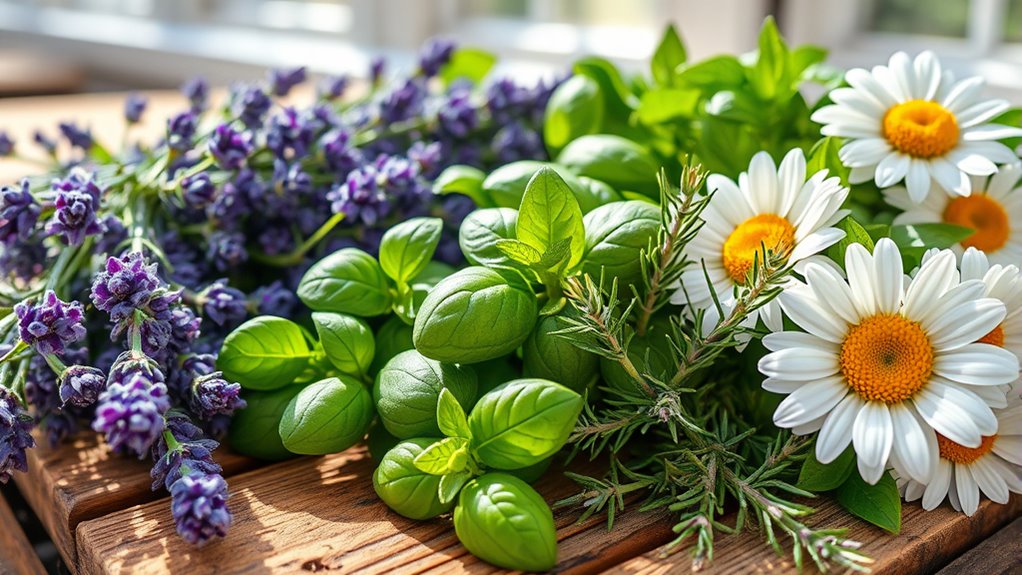
Incorporating stress-modulating herbs into your daily routine can be a simple yet effective way to manage stress and improve overall well-being. Start by establishing herbal tea rituals, such as sipping calming chamomile or adaptogenic ashwagandha teas in the morning or evening. These rituals create a moment of mindfulness and help regulate cortisol levels. Additionally, integrating aromatherapy with essential oils like lavender or frankincense can enhance relaxation, especially when combined with herbal teas. Diffuse these scents during your routine or add a few drops to a diffuser necklace. Consistent practice of these simple habits can promote a calmer mind and lower stress response throughout your day. Small, intentional steps make balancing cortisol levels achievable and sustainable.
Frequently Asked Questions
Can These Herbs Replace Prescribed Medications for Stress Management?
Herbal efficacy varies, and these herbs shouldn’t substitute prescribed medications without your healthcare provider’s guidance. While herbs that modulate cortisol can support stress management, they may interact with medications, affecting their efficacy or causing side effects. Always consult your doctor before making changes, especially if you’re on medication, to ensure safety and proper treatment. Herbs can complement, but not necessarily replace, medication for stress.
Are There Any Side Effects Associated With Long-Term Use of These Herbs?
Long-term safety of these herbs depends on proper use and individual health. You might experience herb interactions or side effects like digestive issues or fatigue if taken excessively. It’s wise to consult your healthcare provider for personalized advice, especially if you’re on other medications. Monitoring your response over time helps guarantee safe, effective use. Always follow recommended dosages and consider periodic breaks to reduce potential risks.
How Quickly Can I Expect to See Stress-Relief Benefits From These Herbs?
You might see stress relief sooner than you think, but it’s a case of waiting for the dust to settle. Typically, within a few days to a few weeks, you may notice improvements, but individual variability plays a big role. Factors like your body’s response and consistency matter. Stay patient and consistent—herbs often work gradually but steadily to help balance your cortisol and ease stress.
Can These Herbs Be Combined With Other Supplements or Medications Safely?
You can usually combine these herbs with other supplements or medications safely, but it’s vital to take into account herb interactions and medication safety. Always consult your healthcare provider before mixing herbs with prescription drugs, especially if you’re on medication for cortisol or hormone regulation. Some herbs may enhance or interfere with medication effects, so professional guidance helps prevent adverse effects and ensures safe, balanced stress management.
What Are the Best Forms (Tea, Capsules, Tinctures) for Consuming These Herbs?
You should choose herbal preparations based on your preferences and lifestyle. Capsules offer convenience and precise dosing, while tinctures provide quick absorption and flexibility in dosage. Tea is a soothing, traditional consumption method that allows you to enjoy the herbs in a relaxing way. Consider your taste, ease of use, and how quickly you want effects when selecting the best consumption method for herbs that modulate cortisol.
Conclusion
By blending bold botanicals like ashwagandha, holy basil, and licorice root into your daily routine, you can better balance your body’s stress response. These herbs harness nature’s healing power to help calm your mind, boost your resilience, and restore your rhythm. Embrace these botanical balms to break free from burnout, foster focus, and find peace amidst life’s pressures. Let nature nurture your nerves and nurture your wellbeing today.










